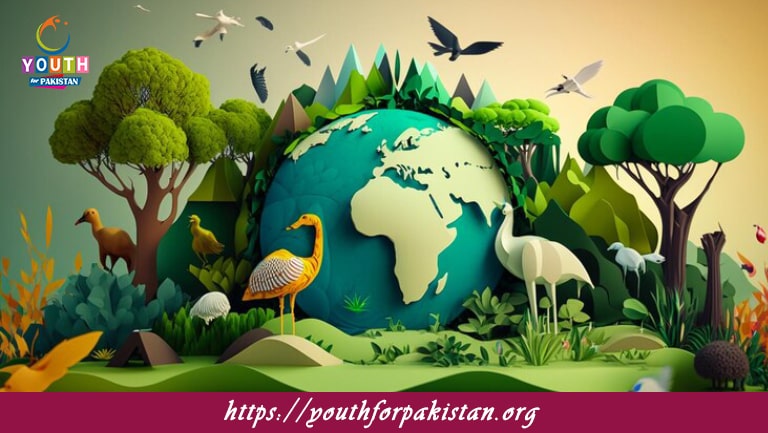Welcome to the Ecology and Ecosystems MCQs with Answers. In this post, we are sharing Ecology and Ecosystems Multiple Choice Questions and Answers in Everyday Science section for various competitive exams in Pakistan. Each question offers a chance to enhance your knowledge regarding Ecology and Ecosystems online MCQs Test.
What is the term for a group of organisms of the same species living in a specific area?
A) Population
B) Community
C) Ecosystem
D) Biome
Which of the following is an example of an abiotic factor in an ecosystem?
A) Temperature
B) Plants
C) Animals
D) Decomposers
What do we call the role or function of a species within an ecosystem?
A) Niche
B) Habitat
C) Biome
D) Trophic level
Which of the following is a primary producer in most ecosystems?
A) Plants
B) Herbivores
C) Carnivores
D) Decomposers
What term is used to describe the relationship between two species in which both benefit?
A) Mutualism
B) Commensalism
C) Parasitism
D) Predation
In a food chain, which organism is typically at the highest trophic level?
A) Apex predator
B) Primary producer
C) Herbivore
D) Decomposer
What is the process by which plants convert sunlight into chemical energy?
A) Photosynthesis
B) Respiration
C) Decomposition
D) Nitrogen fixation
What is the term for an organism that feeds on dead or decaying matter?
A) Decomposer
B) Herbivore
C) Carnivore
D) Omnivore
Which of the following is an example of a keystone species?
A) Wolves in Yellowstone
B) Grass in a savanna
C) Plankton in the ocean
D) Algae in a pond
What type of ecosystem is characterized by water with a high salt concentration?
A) Marine
B) Freshwater
C) Desert
D) Tundra
Which of the following processes is responsible for the movement of carbon between the atmosphere and organisms?
A) Carbon cycle
B) Water cycle
C) Nitrogen cycle
D) Phosphorus cycle
Which of the following is an example of a secondary consumer?
A) Snake
B) Grasshopper
C) Grass
D) Fungus
What is the term for a species that is not native to an ecosystem and may cause harm?
A) Invasive species
B) Keystone species
C) Endemic species
D) Indicator species
Which term refers to a region where freshwater and saltwater mix?
A) Estuary
B) Pond
C) River
D) Wetland
Which type of symbiotic relationship benefits one species while the other is neither helped nor harmed?
A) Commensalism
B) Mutualism
C) Parasitism
D) Predation
In which biome would you most likely find permafrost?
A) Tundra
B) Tropical rainforest
C) Savanna
D) Desert
Which cycle involves the conversion of nitrogen gas into forms usable by living organisms?
A) Nitrogen cycle
B) Carbon cycle
C) Water cycle
D) Phosphorus cycle
What is the term for the maximum number of individuals that an environment can support?
A) Carrying capacity
B) Niche capacity
C) Limiting factor
D) Growth rate
Which of the following organisms is a herbivore?
A) Deer
B) Lion
C) Hawk
D) Spider
What is the process of water moving from the ground into the atmosphere?
A) Evaporation
B) Precipitation
C) Condensation
D) Respiration
Which term describes a relationship where one organism lives off another, causing harm to the host?
A) Parasitism
B) Mutualism
C) Commensalism
D) Herbivory
Which of the following is an example of an autotroph?
A) Algae
B) Tiger
C) Mushroom
D) Eagle
What is the role of decomposers in an ecosystem?
A) Breaking down dead organisms
B) Producing oxygen
C) Pollinating plants
D) Preying on herbivores
Which of the following organisms is an apex predator?
A) Lion
B) Rabbit
C) Cow
D) Grass
What type of succession occurs in an area where no soil or living organisms previously existed?
A) Primary succession
B) Secondary succession
C) Tertiary succession
D) Climax succession
Which of the following describes a climax community?
A) A stable and mature ecosystem
B) The beginning of an ecosystem
C) An area undergoing disturbance
D) A temporary ecosystem
What is the term for organisms that eat both plants and animals?
A) Omnivores
B) Herbivores
C) Carnivores
D) Detritivores
What type of ecosystem exists in tropical regions with heavy rainfall and dense vegetation?
A) Rainforest
B) Desert
C) Tundra
D) Grassland
Which of the following is considered a limiting factor for population growth?
A) Food availability
B) Birth rate
C) Energy flow
D) Climate change
What is the process by which nitrogen is returned to the atmosphere from the soil?
A) Denitrification
B) Nitrogen fixation
C) Photosynthesis
D) Decomposition
Which of the following describes an ecosystem?
A) A community of living organisms interacting with their physical environment
B) A single species living in an area
C) Only the non-living components of an area
D) A group of ecosystems with similar climates
What is the term for species that indicate the health of an ecosystem?
A) Indicator species
B) Keystone species
C) Invasive species
D) Endangered species
Which of the following describes biomagnification?
A) Increase in concentration of toxic substances in higher trophic levels
B) Increase in population growth rate
C) Decrease in biodiversity over time
D) Increase in primary production
Which biome is characterized by having the greatest biodiversity?
A) Tropical rainforest
B) Desert
C) Tundra
D) Grassland
What is the primary source of energy for most ecosystems on Earth?
A) Sunlight
B) Wind
C) Water
D) Geothermal heat
What is the effect of deforestation on ecosystems?
A) Loss of biodiversity
B) Increase in oxygen levels
C) Expansion of ecosystems
D) Increase in primary producers
Which of the following factors is essential for photosynthesis in plants?
A) Sunlight
B) Oxygen
C) Nitrogen
D) Wind
What term describes the natural process by which ecosystems recover after a disturbance?
A) Ecological succession
B) Photosynthesis
C) Biomagnification
D) Nitrogen fixation
Which of the following is a non-renewable resource?
A) Fossil fuels
B) Wind energy
C) Solar energy
D) Biomass
If you are interested to enhance your knowledge regarding Physics, Chemistry, Computer, and Biology please click on the link of each category, you will be redirected to dedicated website for each category.








